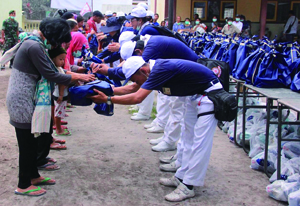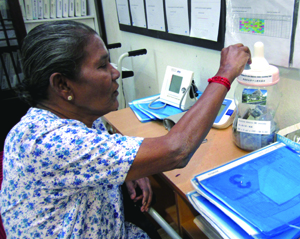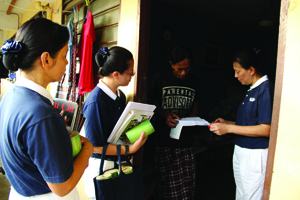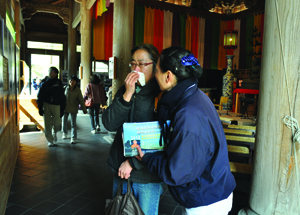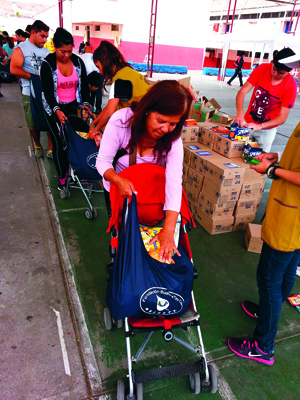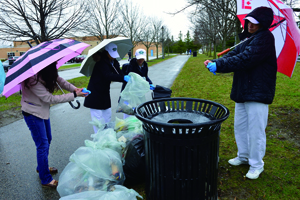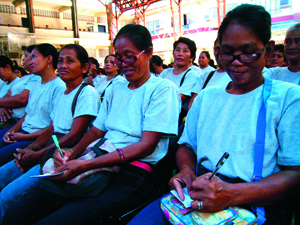

| Tzu Chi Events Around the World | ||||||||||||||
Indonesia Indonesia experienced one natural disaster after another at the beginning of 2014: the eruption of Mount Sinabung in North Sumatra; floods in Jakarta and in Manado, the capital city of North Sulawesi Province; and the eruption of Mount Kelud, located in East Java. Kelud had erupted in 1990 and 2007, but neither was as bad as this time. Officials raised an alert on February 13, before Mount Kelud erupted, and urged people living in a ten-kilometer (6.2-mile) radius of the volcano to evacuate. However, the volcano erupted just 90 minutes after the alert, before the evacuation could be completed. The rumble of the eruption could be heard several hundred kilometers away. Ash spread as far as Bandung, 600 kilometers (375 miles) away in West Java. Shelters were established in the counties of Malang, Kediri, and Blitar, all located near the volcano. According to the East Java government, more than 50,000 people took refuge in the shelters.
When they learned of the eruption, Tzu Chi volunteers in Surabaya, the capital city of East Java, convened an emergency meeting to plan for disaster relief. When volunteers visited the disaster areas to assess the situation, Soekarwo, who was in charge of a shelter, told them that the residents there were basically fine, but they needed more mats, blankets, food, drink, and baby food. Volunteers and military representatives met the day after the eruption and decided to distribute aid to residents from Pujon and Ngantang, both in Malang County, about 45 kilometers (28 miles) from the volcano. About 17,000 victims from those two places were housed in shelters in the town of Kecamatan Kasembon. The volunteers got busy procuring relief goods, including bottled water, sarongs, biscuits, and toiletries. They gathered at the Tzu Chi Surabaya office at five o’clock on the morning of February 16 and set out for Kecamatan Kasembon, three hours away. A total of 40 volunteers and 20 soldiers worked together in the distributions. A lot of goods were distributed to the victims: about 5,700 sets of toothpaste and toothbrushes; 5,900 bars of soap; 5,500 sarongs; 6,000 packs of biscuits; 8,800 packs of instant noodles; 200 kilograms (440 pounds) of rice; 6,600 bottles of water; 15,000 masks; and 600 bottles of eye drops. More distributions were held on the 18th, and included goods such as diapers, milk formula, and mats—stuff which victims had told volunteers that they needed when volunteers held the first distributions on the 16th.
Malaysia About ten percent of Malaysians suffer from kidney disease, resulting in a strong demand for dialysis service in the country. Because many destitute sufferers cannot afford the costs of the treatment, Tzu Chi has established three dialysis centers in the nation to serve the needy free of charge. Tzu Chi opened its Butterworth center in November 2002. It had 11 dialysis machines in service, but over time the demand exceeded the capacity of the center. Therefore, an expansion project was begun in October 2012. While the renovation was underway, the 11 machines continued to serve patients. After 18 months, the expansion work was completed. The dialysis center now has 24 dialysis machines, with enough room for up to 43 machines. Employees and patients at the center enlisted a hundred people to each donate 55 Malaysian ringgit (US$17) a month to help purchase a new dialysis machine. In ten months they had accumulated 55,000 ringgit, enough to accomplish their goal and buy a new dialysis machine. Some patients and visitors also put money into coin banks at the center to help out. For example, a dialysis patient of Indian descent drops in three ringgit (90 US cents) each Friday when she comes in for treatment.
Norhaida MD. Saman, a Muslim, heads the nursing staff at the center. She has worked there for more than eight years. In mid-March she showed patients around the new center to familiarize them with the new place. Everyone was very happy with this bright, new facility.
Malaysia On April 7, a storm damaged the roofs of 16 apartments in Taman Setia Jaya, a community in Alor Setar, Kedah Province. Rain leaked through the roofs into the 20-year-old buildings and soaked the furniture. This was the third time that the residents had suffered such damage. Volunteers assessed the situation the following morning. They left after visiting the victims, but they returned in the afternoon and delivered emergency cash. The home of Salim, one of the victims, suffered the most damage. Before this storm, Tzu Chi volunteers often did fundraising at the night market where Salim worked, and he often donated money to them. When he himself had become a disaster assistance recipient, he understood better why the volunteers worked so hard to solicit donations. Touched by the letter of consolation that they had handed him, he promised to drop coins regularly into a coin bank a volunteer had given him to help the needy.
“This is the first time I’ve received aid from a charity,” said Salem. “I can sense your sincerity from your letter of consolation. I promise that from now on when I meet Tzu Chi volunteers at the night market, I’ll be the first to drop money into their donation box.”
Japan A horrible tsunami devastated the northeastern coast of Japan on March 11, 2011. The lives of many people were turned completely upside down. Though three years have passed, reconstruction in the region has not progressed as many had hoped, and people there are still in need of help. To help keep the memory of the disaster alive and to help boost the local economy, the Umi no Sato Foundation and the Taipei Economic and Cultural Office in Japan joined together to hold the “Northeastern Region Well-being Bazaar” at a temple in Kamakura on March 8 and 9. The Umi no Sato Foundation was established in May 2012, and this was the fourth time it had sponsored the Northeastern Region Well-being Bazaar. Several events were open for the public: a photography expo featuring photos of the March 11 disaster, music performances, and sales of goods and souvenirs from the devastated northeastern region. Of the 28 booths at the bazaar, only two were sponsored by foreign groups: Tzu Chi and a Taiwanese trading company. Kazuki Moriyama, president of the Umi no Sato Foundation, said that Taiwan led all nations in donations to Japan after the March 11 disaster. That was why he had gratefully invited Tzu Chi, a foundation based in Taiwan, to participate in the event. He also hoped that this would help more Japanese people get to know Tzu Chi and Taiwan. Liao Pei-yu (廖珮瑜), an erhu fiddle player from Taiwan, was also invited to perform at the event. Half of the photographs on display were provided by people in the northeastern region or newspaper companies; the other half were furnished by the Tzu Chi Japan branch. At the bazaar, several Japanese from the disaster zones recognized Tzu Chi uniforms from the time the foundation provided aid after the disaster in their areas of residence. They happily greeted the volunteers like long-absent old friends. The volunteers purchased goods from their booths to show their support. To support the event, Tzu Chi volunteers sold food at the bazaar. They began purchasing food ingredients a week earlier and started cooking two days before. They were happy to do something for the disaster area.
Chile Iquique, a port city in northern Chile, is the capital of both Iquique Province and Tarapacá Region. A magnitude 8.2 earthquake rocked the area on April 1, killing six people and setting off a two-meter tsunami. According to government officials, more than 900,000 people and 11 hospitals were evacuated along the coast. Frequent aftershocks left many people camping outdoors. Tzu Chi volunteers from Santiago, 1,800 kilometers (1,125 miles) to the south, flew in on April 10. They planned to hold a distribution of daily necessities on the 12th at a local school to help a thousand families affected by the earthquake. The goods arrived later than planned on the day of the distribution, so volunteers had to hurry to put the goods into individual bags for distribution. Recipients helped with the task as well. Each family received 17 items, including noodles, cooking oil, rice, and beans.
It was the first time that many recipients had ever received aid, so they were understandably quite emotional. Volunteers shared with them the Tzu Chi philosophy of giving without expecting anything in return. A young man said, “I’m touched—I never thought that foreigners would come to help us.” After the large distribution event, volunteers went to distribute more aid at Alto Hospicio, a poor neighborhood in the hills above Iquique and the area that had suffered the most serious damage. Sixty percent of the buildings in the area had been damaged in the quake. It was the first time aid had been distributed there since the tremor. Victims expressed their gratitude to the volunteers for bringing goods and warmth to help them emerge from the setback.
Canada Since the Tzu Chi office in North Toronto was opened on September 15, 2013, local volunteers have been actively promoting and carrying out Tzu Chi work in the surrounding communities. In the process, they came to know Castro Liu, a member of the Richmond Hill council. This spring, Councillor Liu invited Tzu Chi to take part in an Earth Day event held by the Richmond Hill municipal government. The event involved cleaning up Bayview Hill Park, Helmkay Park, and Ritter Park, from 5 p.m. to 8 p.m. on April 25. Though it was cold and rainy on the scheduled day, over 30 Tzu Chi volunteers and students from the Tzu Chi Academy of Humanistic Studies showed up on time at the meeting place. Liu kicked off the event with a short speech, and then volunteer Huang Shu-zhen(黃淑珍) talked about a few things to pay attention to during cleanup.
Liu said that he was surprised to see the volunteers show up for the event as promised; he had thought the cold and rain would discourage them from attending. He looked forward to inviting them to events that the town might host in the future. The volunteers presented him with Tzu Chi magazines and pamphlets with information on the local Tzu Chi office, and they expressed their wish to have a chance some day to visit the town hall and introduce the ideals of the foundation. Lin Tong (林彤), a young student from the Tzu Chi Academy, said that she was glad she had come with her family because it gave her a chance to work outdoors and stay away from her computer games. She said that she would share this experience with her classmates. She also promised that she would participate in similar events in the future. Another participant that afternoon was volunteer Ren Juan-xi (任眷西). Close to 80 years old, she was delighted to participate. It gave her a chance to exercise and to clean up the community as well. Since the North Toronto office opened, she has attended as many Tzu Chi events as she could because she fully identifies with and supports Tzu Chi ideals. Braving the rain, the volunteers started picking up garbage at Bayview Hill Park. After filling 20 garbage bags, they proceeded to Helmkay Park and filled 10 bags there. At the third place, Ritter Park, although it had become even colder by that time, they filled up eight bags of garbage. Councillor Liu drew the day’s activity to a close by presenting certificates of appreciation to the volunteers. Everyone returned home happy to have taken part in a meaningful event.
Philippines Typhoon Haiyan devastated the central Philippines in November 2013. Tzu Chi rendered short-term crisis aid to survivors directly after the storm, and the foundation is planning to build prefabricated homes in areas heavily damaged in the storm. In the course of helping the less fortunate, volunteers have built bonds with many victims in Tacloban. Many aid recipients have been exposed to and have come to identify with Tzu Chi humanitarian ideals. On April 26 and 27, the Tzu Chi Philippine branch held nine training sessions for disaster victims in Tacloban who were interested in volunteering for Tzu Chi. Over 8,000 people attended.
Many people took time off from work to attend the training sessions, including Abraham Ang, who came with his wife. Although a day away from work meant a day without pay, he still chose to come. He said, “I wanted to know the impetus that propelled Tzu Chi volunteers and Master Cheng Yen to help us, and I wanted to do my best to pay back their kindness and to help others in need.” Tzu Chi volunteers had already held training sessions in Tacloban three months earlier, in January. Many attendees of those sessions have since taken up recycling and begun soliciting donations for Tzu Chi. Wearing volunteer uniforms to the sessions this time, they helped maintain order, checked people in, distributed coin banks and snacks, and provided whatever other sorts of assistance they could. “I invited my coworkers to attend the training sessions,” one of them shared. “I told them that though we had been aid recipients, we should all rise from the disaster and become help givers.” |
















|

